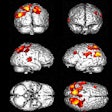Tuesday, November 27 | 11:00 a.m.-11:10 a.m. | SSG09-04 | Room S505AB
Brazilian researchers will tout the clinical advantages of PET/MRI for rectal cancer and present an MRI protocol that keeps total scan time tolerable for patients.Dr. Marcelo Queiroz from the University of São Paulo and colleagues evaluated 55 patients with rectal adenocarcinoma who underwent whole-body PET/MRI for primary staging. MRI sequences included T2-weighted and diffusion-weighted imaging (DWI), followed by whole-body PET/MRI from head to midthigh, before finishing with T2-weighted and DWI of the liver. Any dedicated MR sequence was used for the thorax.
PET acquisition time was an average of 17 minutes, compared with an average scan time of 52 minutes for the MRI portion of the procedure, including the dedicated pelvic and liver MRI sequences.
As for primary lesion detection, PET and DWI were positive in 98% of the cases. Metastatic disease was detected by PET/MRI in 38% of the patients, primarily in the liver (57%), nonregional lymph nodes (48%), and lungs (33%). Liver DWI-MRI detected 64 lesions in 12 patients, compared with PET's detection of 62 lesions in the same 12 patients.
"PET/MRI for rectal cancer staging is feasible, with a tolerable scan time and showing a high incidence of synchronic metastasis," wrote Queiroz and colleagues in their abstract, adding that "optimization of MR protocol would decrease scan time and allow the inclusion of other MR sequences."




















